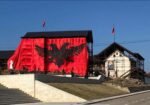Europe may not be at the “table” if the United States mediates talks to end Russia’s war in Ukraine, said U.S. President Donald Trump’s envoy for Ukraine and Russia.
Speaking on a panel at the Munich Security Conference on February 15, Keith Kellogg hinted that Washington intends to make significant progress within a few weeks, emphasizing that he is operating “on Trump time.”
“He wants this job done today, and tomorrow he will want to know why it wasn’t resolved,” Kellogg said. “You need to give us a little space and time, but when I say that, I’m not talking about six months, I’m talking about days and weeks.”
Amid concerns in Kyiv and the European Union that they may be sidelined after Trump spoke with Russian President Vladimir Putin this week and said that Russia and the U.S. would immediately begin negotiations, Kellogg emphasized that Ukraine and Europe would not be excluded.
“You have to include the allies. Will they play a role? Of course, they will. We want to ensure that it’s a sustainable and long-lasting peace,” he added.
However, when asked if he could guarantee to the audience that “Ukrainians will be at the table and Europeans will be at the table,” Kellogg replied, “Well, you just changed the whole dynamic.”
“The answer to the last question… is no,” he said, seemingly referring to Europe. “The answer to the first part of that question is yes, of course, Ukrainians will be there.”
“When you sit at the table… there are two protagonists and a mediator,” Kellogg said, adding, “The fact is we’re looking at—perhaps having Ukrainians and Russians and, of course, Americans at the table.”
In an interview with Radio Free Europe on the sidelines of the conference, Kurt Volker, Trump’s special envoy for Ukraine negotiations from 2017 to 2019, said Kellogg’s comments suggested “Ukraine will be at the table, and there is some uncertainty about how President Trump will handle Europe.”
Earlier, Ukrainian President Volodymyr Zelensky called on European countries to establish a joint army in case of a possible withdrawal of the United States and facing continued threats from Russia.
In his speech on the second day of the Munich Security Conference on Saturday, Zelensky said, “The time has come, European Armed Forces must be created.”
“If the Americans decide to leave, limit their presence, it is not a good thing, of course, it’s dangerous,” Zelensky said.
Zelensky made these appeals at an annual conference, which this year has been dominated by discussions on Ukraine and the new U.S. administration’s stance on ending the war, in which hundreds of thousands have lost their lives since Russia launched a full invasion on February 24, 2022.
Delegates in Munich have expressed concerns over statements made by senior U.S. officials this week, who have implied that Washington is prepared to make significant concessions to Russian President Vladimir Putin.
Speaking in Munich, U.S. officials also reiterated calls for European states to spend more on defense and take on a larger share of the security burden.
Zelensky suggested that the new U.S. administration has a new approach not only to Ukraine but to Europe as a whole. “The old days are over,” he said, adding that Washington needs Europe as a market, but not necessarily as an ally.
According to him, collective power is the answer.
Before Zelensky, German Chancellor Olaf Scholz said he was pleased that the U.S. has reaffirmed its commitment to Ukraine, adding that there should be no agreement without Kyiv’s involvement.
According to him, there cannot be a “dictated solution” and “there cannot be a split” between European and U.S. security.
Scholz added that Germany has given four times more support to Ukraine than the U.S., if support is measured by the percentage of GDP.
The Chancellor, who faces federal elections on February 23, which, according to polls, he is likely to lose, also responded to comments made by U.S. Vice President JD Vance, who criticized Europe’s democracy standards and immigration levels.
“We will not accept that people who look from the outside interfere with our democracy, in our elections,” said Scholz.
Vance’s speech surprised delegates at the conference, who were expecting him to present details of Washington’s plans for peace in Ukraine. Vance also surprised when he later met with Alice Weidel, leader of the Alternative for Germany (AfD) party.







